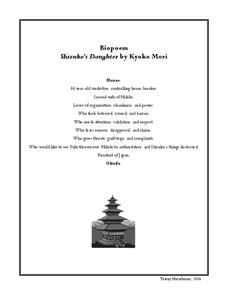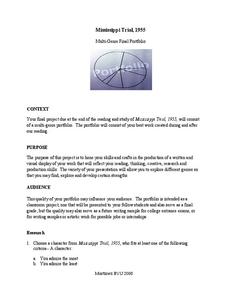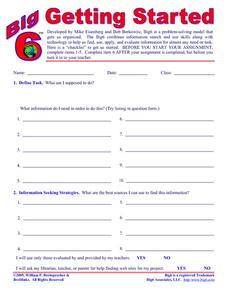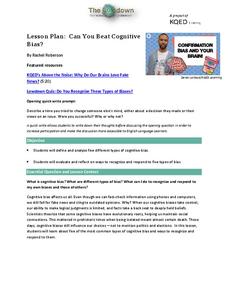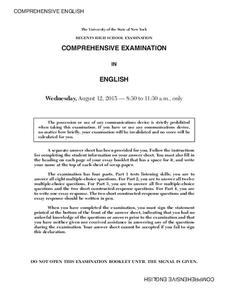Curated OER
Shizuko’s Daughter: Biopoem
The characters in Shizuko's Daughter by Kyoko Mori are complex and vivid. Compare their characteristics with a biopoem, which prompts learners to complete a format with adjectives, relationships, and additional details that describe each...
Curated OER
Mississippi Trial, 1955: Culminating Writing Project (Multi-Genre Final Portfolio)
Designed as the final project concluding a study of Mississippi Trial, 1955, readers select a character from Crowe's novel and craft a portfolio of six entries that reveal not only aspects of the character, but similarities between the...
Novelinks
Nightjohn: Bloom's Taxonomy Questions
After completing Nightjohn, Gary Paulsen's young adult novel about slavery set shortly before the Civil War, readers respond to a series of questions crafted to reflect Bloom's taxonomy.
Curated OER
Defining Character, With Help from History
In a single, soundly-designed class period, high schoolers define good character, think-pair-share about thought-provoking quotes on character (More options would enhance the discussion, worth searching online for other quotes to add.),...
Curated OER
Dandelion Wine: Questioning Strategy
Readers of Dandelion Wine work in groups to develop questions on four levels (right there, think and search, the author and you, and on my own) about Chapter 34 of Ray Bradbury's reflection on the joys of summer. Groups jigsaw and then...
Curated OER
The Heart is a Lonely Hunter: Venn Diagram
“When a person knows and can’t make the others understand, what does he do?” Why (s)he collects evidence and writes an essay! Prepare your readers for a compare/contrast or reflective essay on The Heart is a Lonely Hunter by giving them...
Curated OER
The True Confessions of Charlotte Doyle: Graphic Organizer
After completing the first five chapters of The True Confessions of Charlotte Doyle By Avi, use direct quotes to make inferences about how Charlotte feels about certain characters. Later, when the novel has concluded, revisit the text to...
William P. Breitsprecher & Breitlinks
Getting Started
Set your pupils up for successful completion of projects with a six-step process to help with planning, time management, and reflection. Individuals fill out the first five sections of this handout before they begin their projects,...
Achieve3000
Oral Reading Fluency
Accuracy, phrasing, flow, and pace, the four traits of of oral reading fluency, are the focus of a series of exercises that are designed to help readers develop these comprehension and literacy skills.
Simon & Schuster
Curriculum Guide: The Scarlet Letter
The Scarlet Letter may be a classic, but keeping high schoolers engaged in the reading of Hawthorne's vocabulary, syntax, imagery, and historical references presents it own set of challenges. Here's a guide that offers readers...
Novelinks
The Joy Luck Club: Writing Strategy
Readers of The Joy Luck Club, use a double-0entry journal to record and reflect on passages from Amy Tan's novel.
Novelinks
Wildwood Dancing: Questions using Bloom’s Taxonomy of Thinking Process
Readers respond to a series of questions focused onJuliet Marillier's young adult novel Wildwood Dancing, and crafted to reflect the levels in Bloom's Taxonomy.
NPR
Can You Beat Cognitive Bias?
In a time of fake news, media manipulation, and Internet trolls, a resource equips learners with the tools they need to recognize and combat resources that are designed to appeal to our cognitive biases. Introduce learners to five...
New York State Education Department
Comprehensive English Examination: August 2015
Looking at literature through a critical lens helps readers connect the text to the larger world. An essay examining the theme "There is no ill in the world without a remedy" forms the main part of a sample comprehensive English...
Virginia Department of Education
Writing for Workplace and Postsecondary Correspondence
Create or expand your college essay and career unit with a business and postsecondary writing activity. The exercise works for college-bound or job-hunting junior or senior learners. They bring their research concerning a college or...
Novelinks
The Adventures of Tom Sawyer: Cubing Strategy
The toss of a die determines what questions your pupils will answer in this instructional activity. Learners respond to questions based on Bloom's taxonomy, discussing The Adventures of Tom Sawyer with classmates along the way. They...
Curated OER
Lesson: Paul Chan: 1st Light and 5th Light
Paul Chan's latest exhibit includes seven manifestations of light. Today, kids analyze the pieces 1st Light and 5th Light. They consider the concept of opposed or dualistic realities found in literature, society, and Chan's work. They...
Annenberg Foundation
Rhythms in Poetry
Rhyme, rhythm, free verse, imagery: Do these words describe poetry, or jazz music? The answer is both! A resource explores these similarities as scholars watch a video, engage in discussion, read author biographies, write poetry and...
Curated OER
Manifest Destiny
Students explore the Manifest Destiny. They interpret quotations, study point of view in writing, research English words that derived from Mexico, and analyze reasons why settlers moved west. After writing journal entries in first-person...
Curated OER
Swirling, Twirling, Glistening Jewels... Glass Art In Words
Young scholars examine the art form of the glass sculpture. After viewing a three dimensional object, they write creatively describing the object through the use of metaphors. They use peer editing to check for grammatical and spelling...
Curated OER
Dancing Opposites (Size)
Students create movements that illustrate opposites. In this opposites lesson plan, students discuss what opposites do for writing and relate to dance. Students make movements based on their opposites.
Hawaiʻi State Department of Education
ABA Form in Music
Patterns happen everywhere, in music, math, and language! Fourth graders listen to the "William Tell Overture" visualizing the patterns that they hear. They then discuss and write an ABA poem that matches the ABA form found in the music...
Curated OER
Read My Expression
Learners create a facial expression in clay using slabs of clay and coils that convey a feeling inspired by a poem in this excellent cross-curricular instructional activity suitable for the Laqnguage Arts or Art classroom. National...
Curated OER
Language Arts: Character Analysis
Fourth graders identify the character traits of Peter in Tales of a Fourth Grade Nothing. They find quotations in the story that illlustrate the traits. Students use Kidspiration to write their reports on a template.


